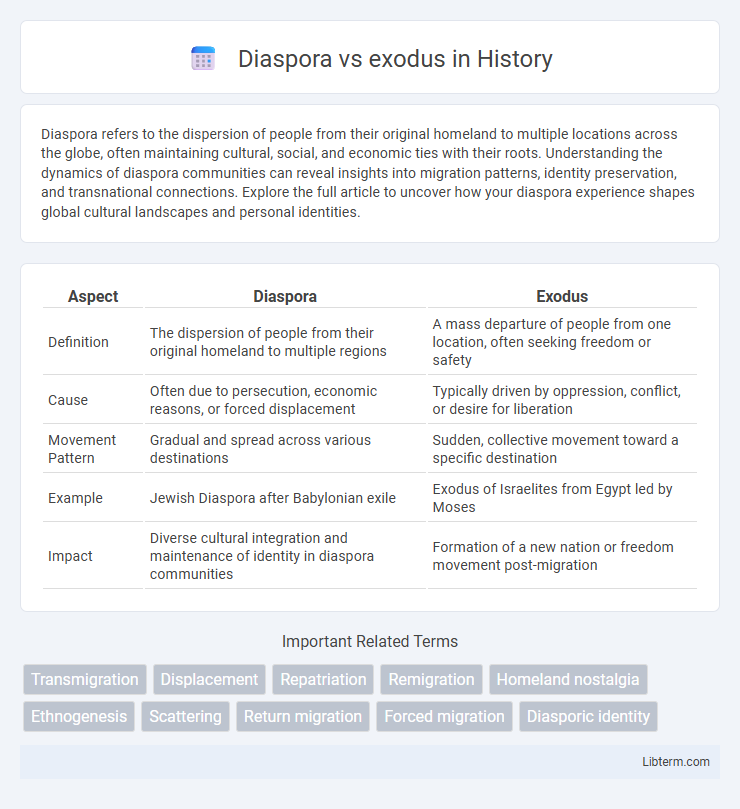Diaspora refers to the dispersion of people from their original homeland to multiple locations across the globe, often maintaining cultural, social, and economic ties with their roots. Understanding the dynamics of diaspora communities can reveal insights into migration patterns, identity preservation, and transnational connections. Explore the full article to uncover how your diaspora experience shapes global cultural landscapes and personal identities.
Table of Comparison
| Aspect | Diaspora | Exodus |
|---|---|---|
| Definition | The dispersion of people from their original homeland to multiple regions | A mass departure of people from one location, often seeking freedom or safety |
| Cause | Often due to persecution, economic reasons, or forced displacement | Typically driven by oppression, conflict, or desire for liberation |
| Movement Pattern | Gradual and spread across various destinations | Sudden, collective movement toward a specific destination |
| Example | Jewish Diaspora after Babylonian exile | Exodus of Israelites from Egypt led by Moses |
| Impact | Diverse cultural integration and maintenance of identity in diaspora communities | Formation of a new nation or freedom movement post-migration |
Understanding Diaspora: Definition and Origins
Diaspora refers to the dispersion of a population sharing common ethnic, religious, or cultural heritage beyond their original homeland, often resulting from historical migrations or forced displacement. Its origins trace back to ancient events like the Babylonian Exile of the Jewish people, which established a pattern of communities maintaining identity while living abroad. Understanding diaspora involves recognizing its impact on social networks, cultural preservation, and transnational connections across global populations.
Defining Exodus: Historical Context
Exodus refers to the mass departure of people from a specific place, often under compulsion or crisis, as seen in the biblical story of the Israelites leaving Egypt. Historically, exoduses involve fleeing from catastrophic events such as wars, famines, or persecution, resulting in temporary or permanent relocation. This contrasts with diaspora, which denotes a widespread dispersion of a population maintaining cultural ties despite geographic separation.
Key Differences Between Diaspora and Exodus
Diaspora refers to the widespread dispersion of a population from their original homeland, often occurring over extended periods and involving cultural integration in multiple regions. Exodus denotes a mass departure or migration of people from one location to another, typically driven by immediate causes such as conflict, persecution, or disaster. Key differences include diaspora being a prolonged, often voluntary or forced cultural dispersion, whereas exodus is a more acute, large-scale migration event marked by urgency or crisis.
Causes Behind Diaspora Movements
Diaspora movements often arise from a combination of political instability, economic hardship, and social persecution that compel communities to disperse across multiple countries while maintaining a connection to their homeland. Unlike exodus, which usually denotes a mass departure triggered by an immediate crisis such as war or famine, diaspora involves prolonged displacement resulting from persistent factors like systemic discrimination or colonialism. Historical examples include the Jewish diaspora caused by centuries of persecution and the African diaspora resulting from the transatlantic slave trade.
Triggers Leading to an Exodus
Triggers leading to an exodus often include severe political persecution, armed conflict, and widespread economic collapse, forcing large populations to flee their home countries in search of safety and stability. Natural disasters and environmental degradation can also prompt mass migrations, as communities realize their livelihoods are unsustainable. These immediate, life-threatening circumstances distinguish an exodus from a diaspora, which typically involves a more prolonged dispersion of people over time due to historical, social, or economic factors.
Cultural Impact of Diaspora Communities
Diaspora communities significantly shape cultural landscapes by preserving ancestral traditions while blending them with host country influences, creating unique hybrid identities. These communities often serve as bridges for cross-cultural exchange, promoting linguistic diversity and artistic innovation across global societies. Their sustained cultural presence bolsters social cohesion and economic contributions, reinforcing multiculturalism and enriching national heritage.
Social Consequences of Mass Exodus
Mass exodus often triggers immediate social upheaval, including the breakdown of community networks and increased strain on local resources in receiving areas. In contrast, a diaspora, characterized by a dispersed population maintaining cultural ties, fosters long-term social cohesion and collective identity despite geographical separation. Both phenomena reshape social structures, but mass exodus tends to amplify short-term displacement challenges and social fragmentation.
Diaspora and Identity Formation
Diaspora refers to the dispersal of a population from its original homeland, often shaping collective identity through shared cultural practices and historical memories. Unlike exodus, which denotes a mass departure or migration, diaspora involves sustained connections across different regions, fostering a transnational sense of belonging and hybrid identity. This phenomenon significantly influences identity formation by integrating diverse experiences and maintaining cultural heritage despite geographic displacement.
Modern Examples of Diaspora and Exodus
Modern examples of diaspora include the Jewish community dispersed globally after World War II and the Syrian diaspora resulting from the ongoing civil war since 2011. In contrast, exodus is exemplified by the 2015 European migrant crisis, where large groups of refugees and migrants made mass movements seeking asylum and better living conditions. Diaspora often involves the maintenance of cultural identity over time, whereas exodus refers to immediate, large-scale departures driven by urgent crises.
Global Implications: Diaspora vs Exodus
Diaspora refers to the widespread dispersion of a population from its original homeland, often leading to the formation of vibrant, multicultural communities that influence global culture, economics, and politics. Exodus describes a large-scale, often sudden migration of people, typically driven by crisis or conflict, resulting in humanitarian challenges and shifts in regional demographics. Both phenomena shape international relations and global migration patterns but differ in their long-term impacts on cultural integration and geopolitical stability.
Diaspora Infographic

 libterm.com
libterm.com